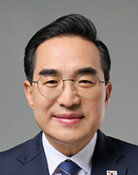Nation strives to become software power
Nation strives to become software power
Posted February. 26, 2001 19:29,
``We will develop into one of the world’s top 100 Information Technology (IT) companies.``
Handysoft, a leading Korean software (SW) developer, made this declaration when it announced plans to promote a five-fold increase in sales from last year to some 200 billion won in 2003. The company`s entry into the ranks of top 100 IT firms, if it materializes, would be somewhat belated given that manufacturing companies such as Samsung Electronics, Pohang Iron and Steel Co. and Hyundai Motor have already obtained the status of world industrial leaders. However, the aim is viewed as an ambitious one since the nation has a relatively short history of software development and a shortage of specialized manpower.
But changes seem to be at hand as an increasing number of people are calling for the need to develop the nation into an international SW power. The Federation of Korean Industries and Korea Federation of Small and Medium-Sized Businesses recently unveiled a plan to foster the SW industry into an export-oriented one through cooperation between large corporations and small- and medium-sized enterprises (SMEs). President Kim Dae-Jung also strongly emphasized the need to foster the industry earlier this month when he said, ``The SW industry is a representative, intelligence-based industry whose success depends heavily on creative ideas and technologies.`` In tandem with such moves, the Ministry of Information and Communication is drawing up a comprehensive plan to develop the domestic SW industry into a core export industry through massive support measures.
Yet, the Korean SW industry has a long way to go before it can be considered a power in the IT field. The industry still carries the stigma of being a ``paradise of piracy,`` as even government agencies publicly use pirated programs.
Miserable situation:
According to statistics compiled by the Korea Institute of Multimedia Contents and Software, domestic SW companies chalked up a combined 12.83 trillion won in sales last year, less than half the 28.68 trillion won in sales reported by Microsoft Co., the world`s top SW company.
Moreover, most of the products turned out by Korean firms were sold on the domestic market. The Korean SW industry exported 116.8 billion won worth of goods in 2000, less than 1 percent of its total sales. Consequently, the domestic industry can hardly avoid accusations that it is a ``frog in the well which does not know the ocean.``
Most of the participating firms are quite small and compete with each other in a very inefficient way. HandySoft and Haansoft Inc. are big-name players in the industry but their sales amounted to only 41.6 billion won and 35 billion won, respectively, last year. Only ``Neoplus`` of Duzon Digitalware Co., which grew to dominate the domestic market thanks to a governmental management control program for SMEs, recorded robust sales last year. According to the company`s results, it posted slightly over 10 billion won in sales in 2000. This was still modest compared to firms in India, which boasts five SW companies whose sales exceeded $100 million in 1999. Combined, the five Indian companies reported sales exceeding that of the entire Korean software industry.
Why the nation should become a SW power:
In the past three years, the global economy grew 3.4 percent on average each year but the IT industry grew at a rate of 10 percent per annum. Moreover, the SW industry is expected to record an average annual growth rate of 16 percent in years to come, the highest among IT industries. For this reason, it is essential for Korea to foster its SW industry in order to sustain its high growth rate.
The SW industry is a high-value-added business. Ncsoft Co., a game SW developer, recorded net profits equivalent to 59 percent of its sales last year. The industry also plays a role in improving the employment structure. The average monthly salary of an employee in the SW industry was 2.2 million won in 1999, well above the industrial average of 1.43 million won.
Is it a dream to become a SW power?:
Prospects are gloomy under the current circumstances, but an increasing number of experts forecast the possibility of success. Sales of SW products accelerated from 25.6 percent in 1998 to 36.3 percent in 1999 and 46.1 percent in 2000. Exports also rapidly grew from 26.5 percent in 1998 to 42.6 percent in 1999 and 57.3 percent in 2000.
Achievements by individual companies were also notable. Duzon Digitalware`s sales increased to 14.7 billion won last year, up 145 percent from those in 1999. Its net profits also increased by 4 billion won. The number of companies making such outstanding achievements is climbing.
More and more companies are also tapping overseas markets. Ahnlab Inc. began exports to Japan in 2000 and has plans to advance into the U.S. and Chinese markets this year. Haansoft exported 1 billion won worth of SW programs to Japan last year. Namo Interactive Inc., a Web page manufacturing SW company, is already exporting goods to 23 countries.
``Indian SW companies accumulated experience and technological strength through the original equipment manufacturing (OEM) method and then used this as the basis for expanding their presence in overseas markets,`` said Song Min-Sun, a researcher at the LG Economic Research Institute. ``Korean companies will also have to boost alliances with foreign companies.``
Cheon Kwang-Am iam@donga.com




![[단독]“거부도 못해” 요양병원 ‘콧줄 환자’ 8만명](https://dimg.donga.com/c/138/175/90/1/wps/NEWS/IMAGE/2026/03/02/133450041.2.jpg)


